Five days a week, at 8:30 a.m., two-year-old Catherine Arias arrives at a children's hospital in Valhalla, New York — 10 miles north of New York City.
Her mother says she's often tired, just starting to wake up, but she has a full day of therapies to get to: depending on the day, physical and occupational to improve her strength and motor skills, speech therapy to improve her language skills and even feeding therapy to make sure she's eating well, all of which lasts until 11:30 a.m.
This has been Catherine's life for the past year, ever since she was accidentally shot during a drive-by shooting in the Bronx in January 2022 while sitting in a parked car with her mother.
Her parents, Miraida Gomez and Gregory Arias, spoke to ABC News exclusively about Catherine's recovery more than one year after the shooting.
MORE: Experts reveal mental health impacts of mass shootings on young survivors
They say her story is a reminder of the far-reaching effects of gun violence, particularly on young victims, and how the trauma — both for the patient and the families — doesn't end after the initial discharge from the hospital.
"It's definitely a lifelong battle after the incident," Gomez told ABC News. "I don't look at my child as disabled, I don't look at her with any disabilities. But the reality is that these are her medical diagnoses…Following the incident, it's affected our mental health."
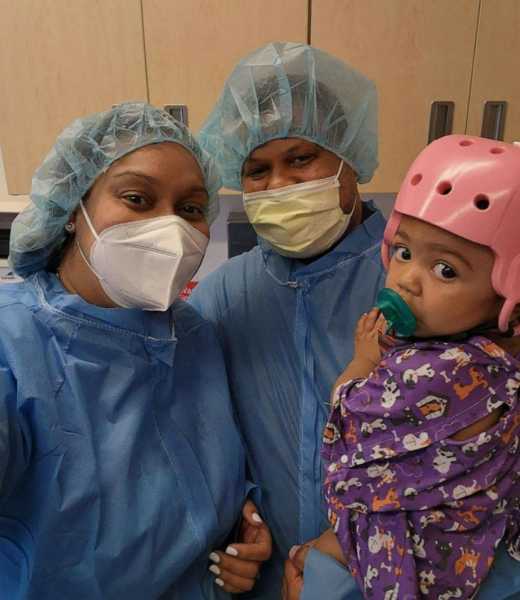
Miraida Gomez, Gregory Arias and Catherine before her cranioplasty in April 2022.Courtesy of Miraida Gomez and Gregory Arias
Shot while sitting in a parked car
On Jan. 19, 2022, two days before Catherine's first birthday, Gomez and Arias say they left their two older children — Delilah, 7, and Haylee, 12 — at their grandparents' house for a sleepover and left to go home with Catherine.
They say they stopped at Leroy Pharmacy on Valentine Avenue and 198th Street in the Bronx to pick up Gomez's thyroid medication. Arias went inside while Gomez and Catherine waited in the back seat of the parked car outside.
While Arias was inside, gunshots rang out. Gomez — holding Catherine — dropped down behind the driver's seat. When she sat up, Gomez said she realized her toddler was half-gasping, half-crying and her baby pink coat was red with blood.
A stray bullet had hit the car, entering Catherine's left cheek and exiting at the top of her head.
MORE: The difference in treating child victims of gun violence versus adults
Gomez said she got out of the car, immediately began performing CPR on Catherine and when her husband exited the pharmacy she told him to call 911.
"She just tells me, 'Call 911, Catherine has been shot' and the rest of the time is super slow down and I couldn't even focus on three simple numbers: 9-1-1," Arias told ABC News. "And that was the beginning of the, I wouldn't say nightmare, but of the surreal experience of knowing that an 11-month-old child — your child — was shot."
An ambulance arrived and took Catherine to Weill Cornell Medical Center in Manhattan, where she stayed for two weeks.
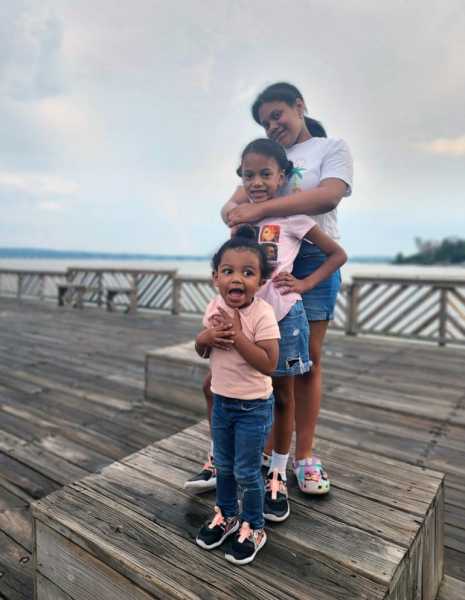
Catherine and her sisters Delilah and Haylee at Mario Cuomo Bridge in New York, June 2023.Courtesy of Miraida Gomez and Gregory Arias
Four months in the hospital
During that time, Gomez said Catherine had surgery to remove parts of her frontal, parietal, and temporal lobes on the left side of the brain. The left side of her skull was shattered by the bullet, which required her to receive a titanium implant.
Catherine also experienced a stroke early in recovery, which resulted in a weakening of the muscles on the right side of her body.
"We were initially told that she may not be able to walk again, her speech may not be the same," Gomez said. "So that's pretty much what we were looking at when they gave us the initial diagnosis following the injury."
After two weeks, Catherine was transferred to Blythedale Children's Hospital in Valhalla, where Dr. Kathy Silverman, unit chief of the pediatric, adolescent and traumatic brain injury units, was her attending physician for the entire length of her stay.
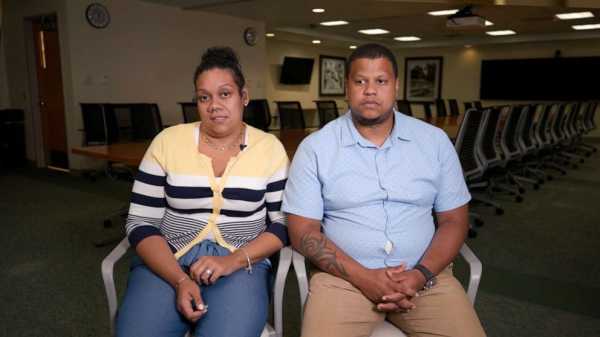
Miraida Gomez and Gregory Arias discuss the recovery of their daughter, Catherine, after she was shot during a drive-by shooting.ABC News
"Catherine was a normal child, she was healthy, she was developing normally," Silverman said, but the gunshot wound came with major consequences. "From then on, she had weakness on the right side of her body, she had difficulty swallowing, she had visual deficits. she had difficulty with bowel and bladder issues, she had difficulty with moving, all the things that a child is able to do."
Catherine slowly began improving and was eventually discharged from inpatient therapy in April 2022, but she continues to receive a variety of therapies — feeding, occupation, physical and speech — every day with each session lasting about half an hour, her parents say.
A GoFundMe set up by a relative helped make sure they were fed and able to pay their bills. Additionally, because of Catherine's disability, her parents say they were able to get Medicaid, which helps cover the cost of her therapies. They're still waiting to see if they'll be approved for Social Security disability which, for children, is approved according to the parents' income.
Arias's job involves driving trucks, so Gomez is usually the parent who takes Catherine to her therapy sessions. She said her consulting job has allowed her to work remotely.
Recovery more than a year later
Catherine initially had a feeding tube when she was in the hospital and, after it was removed, a swallow study showed thinner liquids were going down the wrong way into her lungs.
MORE: Why semi-automatic rifles like those used in the Nashville shooting can cause so much damage
Because of this, she has to drink thicker liquids, Gina Longarzo, a senior speech-language pathologist at Blythedale Children's Hospital, told ABC News. That's one of the reasons Catherine is in feeding therapy.
Catherine has since been able to have thinner liquids, but not yet to the consistency of water, Longarzo says. She also is working on trying new kinds of food.
"We're working on aversion because when a child goes through a trauma like [Catherine] did, they can become aversive to food, because it's something they can control," Longarzo said. "So, they're not controlling a lot of what happened to them, but they can control what they eat."
Although physicians cannot know for certain how long Catherine would benefit from continuing therapies, Silverman said she will need them, likely, for years.
"It's a lifelong recovery," she said. "This has changed the course of her life when that happened to her. It's changed the life of her family as well."
Research has shown that there has been an increase in gun violence, particularly, among children, since the COVID-19 pandemic.
One study, led by Dr. Jonathan Jay, an assistant professor of community health sciences at Boston University School of Public Health, looked at fatal and non-fatal shootings in four cities: New York City, Chicago, Los Angeles and Philadelphia.
"We saw that shootings affecting children, they nearly doubled across those cities, and that the impacts were disproportionately experienced by children of color," Jay, who studies gun violence and its impacts, told ABC News. "So, the racial disparities, the gaps between children of color and white children, which were already large, they got even larger."
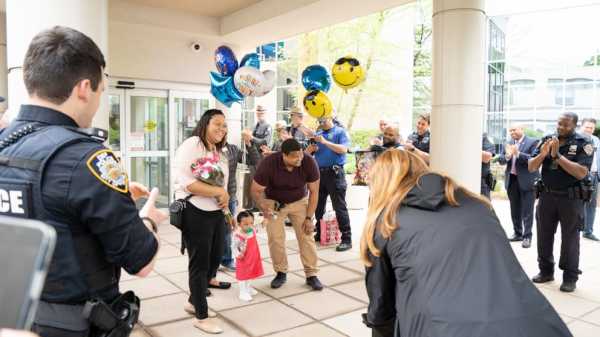
Catherine and her parents, Miraida Gomez and Gregory Arias, walk out of Blythedale Children’s Hospital for her initial discharge, May 2022.Courtesy of Blythedale Children’s Hospital
He added, "In fact, the only group for which the pandemic shooting rate did not increase was non-Hispanic white children, so there was something going on in those cities where white children were able to stay safe while all other children were not."
While fatal gun injuries can be devastating for a family, non-fatal gun injuries can also have devastating impacts. Jay said between two and four times as many gun injuries are not fatal compared to those that are fatal.
"Even if you survive a firearm injury, there are important lasting physical health effects," he said. "Many firearm injuries cause long-term physical disability, and also really important mental health effects, so we expect to see anxiety, depression, PTSD."
'This has affected our mental health'
Gomez said this has affected her own mental health as well as the mental of their other two daughters.
"Whenever there's a lockdown at the school, it's enough to send our 12-year-old into a panic," Gomez said. "Our seven-year-old started to decline in her in her studies, because all she could talk about was 'bad people shooting.' So, we've gone through a lot as a family."
Gomez said she suffers from anxiety, PTSD and intrusive thoughts and while therapy has helped her, it's still an ongoing battle.
"In the moment, if I'm at a red light, I'm driving, sometimes the thoughts of getting shot comes into my head, and that's because I was sitting right next to my daughter when she got shot," Gomez said. "Whenever I hear that the schools are on a lockdown, the only thing I can think of is, 'How can I get my babies out of the school safely?'"
MORE: How a hospital treated victims of the Buffalo shooting
Arias added that for a while, he wasn't even able to look outside of a window without the visualization of Catherine just after she was shot. He's still worried about taking his children out sometimes.
"That's the debilitating part for us," he said. "It's just, we can't enjoy outside time, can't even enjoy going to the park. What if people just decide to go off on a rampage and get into it with each other over nonsense and we're just there and it's like, there's no way out?"
When Catherine was born, Arias said the family moved to the eastern part of the Bronx because they believed it would be quieter and more residential than the western part. The shooting occurred in their old neighborhood.
Now the family is considering leaving the Bronx altogether and either moving to the suburbs or even out of state completely.
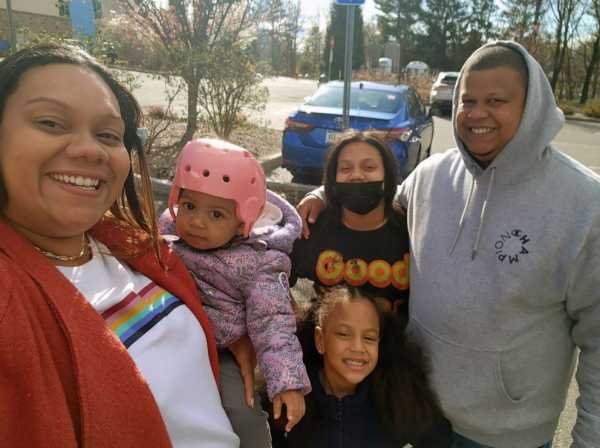
Miraida Gomez, Catherine, Haylee, Delilah and Gregory Arias, in Spring 2022.Courtesy Miraida Gomez and Gregory Arias
Catherine's parents said the experience has made them stronger as a family unit and they don't want Catherine's whole life to be defined by this one incident, but they are nervous about how they will one day have to explain what happened to her.
"As I see my kid getting older, how am I going to explain to her that she got shot?" Gomez said. "How is that going to affect her mental health and understanding. You know, 'Hey, my right side may be weak because I got shot,' or 'I have half of my skull as a plate because I got shot.'"
She added, "That's not normal. A kid shouldn't have to live this experience, be told this by their parents. So, it's heavy."
Sourse: abcnews.go.com






